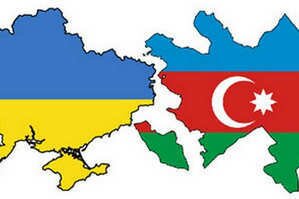
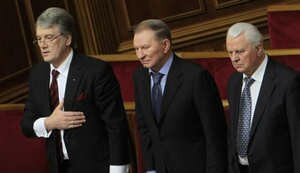 Oleh Makhno
Oleh Makhno
“...We immediately need new agreements with Azerbaijan. I am sure that this visit at a high level will take place very soon. Together with former Ukrainian Presidents Leonid Kuchma and Viktor Yushchenko, I will prepare proposals for the development of relations with Azerbaijan and will present them to the President. Now we are considering this issue. We have received an invitation to the 4th Global Forum in Baku. During the forum, we will discuss this issue,” promised recently L. Kravchuk, commenting on the possibility of P. Poroshenko's forthcoming visit to Azerbaijan. This phrase shows the importance of bilateral relations between Kyiv and Baku in general, and the prospects of the said Forum in particular. Here our first President acknowledges that Ukraine for a long time (actually all the years of its independence) has been inexcusably neglecting its relations with the Caspian state. And the attempt to voice objective reasons for that sounds as a justification for the short-sightedness of those who ex officio had to develop our state's international relations?
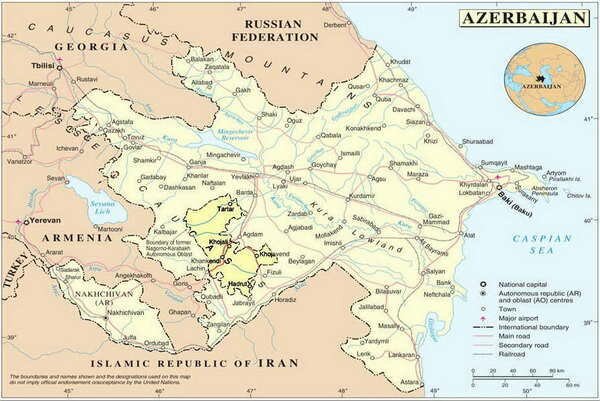
Historically, “the Caspian direction” has always been a kind of umbilical cord of modern geopolitics, which this way or other “feeds” all global events taking place in the world, including those relating to Ukraine. If nothing else, we may just mention actually identical in Azerbaijani latitudes “branches” (Russian and Ukrainian) of the Silk Road or the planned for the construction gas and oil pipelines to deliver hydrocarbons from the Caspian Sea to Europe, let alone different possible transit and aeronautic routes, etc. At this, we can't shrug off the existing problems in relations between the Caspian states and their immediate neighbors. Those problems are not much easier than today's problems of Ukraine. For example, the Iranian proposal to the neighboring Azerbaijan States to re-divide between them the Caspian Sea coastal zone, where as if anew emerges the prospect of development and production of hydrocarbons.
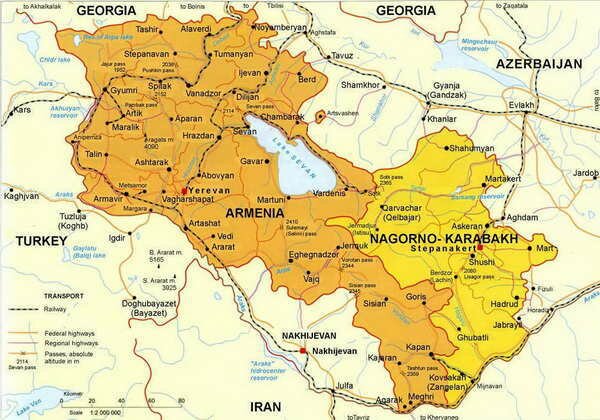
Or the smoldering for more than 20 years armed confrontation between Azerbaijan and Armenia over Nagornyi Karabakh. This period was more than enough for the world to somehow get used to this conflict. As it seems to be getting used to the annexation of the Crimea and to the fighting in Luhansk and Donetsk regions. Perhaps these similar situations in a certain way can simplify the development of approaches to solving the existing in Azerbaijan and Ukraine issues... By the way, this can be helped by a small but, in my opinion, very important detail: at the diplomatic level, the Azerbaijani leadership does not seek “cooperation against someone, (unlike the Kremlin, in particular, with its EAEC partners), but looks for the “mutually beneficial cooperation with someone”. That is, in Baku they prefer to maintain civilized partner relations, when the interests of all sides are respected, and now rely on mutually beneficial relations with both the West and the Middle East and China. So their policy is more prominent than the recent Ukrainian “multi-vector” one. Had Baku started implementing its current plans ten to fifteen years ago, without a backward glance at the Kremlin, it would have avoided many an economic turmoil.
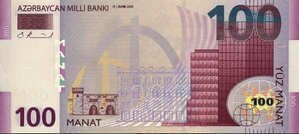 For example, Azerbaijan's currency Manat, which for a long time had almost equaled the US dollar, would not have fallen today by almost 50 % of its value and would not have caused such (already familiar to Ukrainian citizens) a market hype among Azerbaijanis. The assets of the State Oil Fund of Azerbaijan Republic (SOFAZ), established in 1999 specifically for the accumulation of income from the sale of oil contracts, would not have devalued. According to the Head of the Department of Risk Management of SOFAZ B. Bahramov, back on the 1st of October, 2015, these assets totaled 34.738 billion US dollars, while in October-November, they already depreciated to 729 million US dollars or by 2.1 %. Clearly, this is very painful for Azerbaijan's GDP, 70 % of which (and sometimes more) was formed at the expense of the oil sector. Over time, the Azerbaijani leadership began to realize that relying, like Russia, on petrodollars was unwise and even dangerous. Experts had been pointing to the unpardonable shortsightedness of such a policy, especially in the last two years. For example, the Head of the Oil Workers’ Rights Protection Committee Mirvari Gakhramanly in her speech in September 2015 warned: “According to the International Energy Agency, in 2016 the countries that are not members of OPEC, including Azerbaijan, will face a record decline in oil production... This whole process is affected by political events, in particular the sanctions against Russia, the lifting of sanctions against Iran, and others”. And the Chief of the Baku Oil Research Center Ilham Shaban, categorically predicted a difficult 2016 for Azerbaijan.
For example, Azerbaijan's currency Manat, which for a long time had almost equaled the US dollar, would not have fallen today by almost 50 % of its value and would not have caused such (already familiar to Ukrainian citizens) a market hype among Azerbaijanis. The assets of the State Oil Fund of Azerbaijan Republic (SOFAZ), established in 1999 specifically for the accumulation of income from the sale of oil contracts, would not have devalued. According to the Head of the Department of Risk Management of SOFAZ B. Bahramov, back on the 1st of October, 2015, these assets totaled 34.738 billion US dollars, while in October-November, they already depreciated to 729 million US dollars or by 2.1 %. Clearly, this is very painful for Azerbaijan's GDP, 70 % of which (and sometimes more) was formed at the expense of the oil sector. Over time, the Azerbaijani leadership began to realize that relying, like Russia, on petrodollars was unwise and even dangerous. Experts had been pointing to the unpardonable shortsightedness of such a policy, especially in the last two years. For example, the Head of the Oil Workers’ Rights Protection Committee Mirvari Gakhramanly in her speech in September 2015 warned: “According to the International Energy Agency, in 2016 the countries that are not members of OPEC, including Azerbaijan, will face a record decline in oil production... This whole process is affected by political events, in particular the sanctions against Russia, the lifting of sanctions against Iran, and others”. And the Chief of the Baku Oil Research Center Ilham Shaban, categorically predicted a difficult 2016 for Azerbaijan.
“ The Agency's forecast of reducing production in 2016 by half a million barrels a day — is a low figure, the world will survive, — he said in an interview. — Especially if you pay attention to the fact that Iran is going to produce 1 million barrels a day. Indeed, 2016 will be difficult, including for Azerbaijan. According to my forecast, if in the current 2015 production is reduced by 700 thousand tons, next year this figure will reach 1 million”.
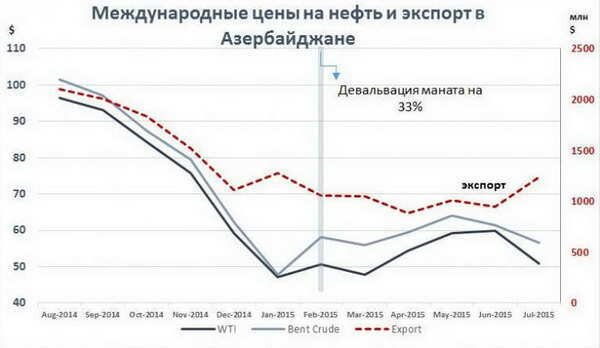
Three-fold drop in oil prices during 2015 has no natural economic reasons, as stated already in December by the President of Azerbaijan, Ilham Aliyev, considering the price of 36 US dollars per barrel “deliberate policy, the aim of which is no secret”. “Azerbaijan is suffering significant losses in the current situation. The fall in oil prices has had a negative impact on the national currency. The reason for the devaluation of the Manat is lower oil prices. The change of the exchange rate of the Manat was inevitable. For a year, we had been trying to prevent this as much as possible, waiting for oil prices to get stabilized. When they did get stabilized at the level of 50 US dollars, we calmed down a bit, considering that there would be no need for devaluation. But at the moment the price of oil has fallen to 36 US dollars,” said the Head of the State. December 21, 2015, the Central Bank of Azerbaijan moved to a floating exchange rate of the national currency, which resulted in the Azerbaijani Manat's falling within a day by 47.63 % and 47.88 % against the dollar and euro, respectively.
 It is necessary to pay tribute to the official Baku, which, albeit belatedly, did introduce some changes in the non-oil sector. And in this issue it seems to be following in the footsteps of Ukraine, that is, it takes into consideration the latter's bitter experience. Today 52 % of Azerbaijan's GDP is generated by the oil sector (as opposed to the previous 70 %), and 48 % — at the expense of the non-oil sector. The difference is almost 18 % — significant, but still not allowing the Azerbaijani economy to feel confident. Here is how the economic expert Oktay Akhverdiyev has commented on Standard & Poor's recent ranking in relation to Azerbaijan's economy: “I fully agree that as long as we depend on one sector of our economy, Azerbaijan will remain at risk. The fact that GDP depends on the situation on the world market means that this country is under the hood of risk. When one sector, such as oil one, has hard times, the other, for example metallurgical sector, should support the economy. Only a diversified economy could lead the country to a higher position. As for the neighboring countries on the podium, they have the same problem. For example, Uzbekistan depends mainly on cotton, Kazakhstan and Russia — on oil, Turkmenistan — on gas, etc. Therefore it is not surprising that we are on the same position with these countries”. The expert is sure that within the next 5-6 years, the degree of risk in the economy of Azerbaijan will have decreased. He recently said in the presence of journalists “for the country's economy to as little as possible depend on oil and gas, it is necessary to more actively develop the non-oil sector. And this is prevented by... corruption and monopolies in the consumer market. The sooner this problem is solved, the more successfully the non-oil sector will develop”.
It is necessary to pay tribute to the official Baku, which, albeit belatedly, did introduce some changes in the non-oil sector. And in this issue it seems to be following in the footsteps of Ukraine, that is, it takes into consideration the latter's bitter experience. Today 52 % of Azerbaijan's GDP is generated by the oil sector (as opposed to the previous 70 %), and 48 % — at the expense of the non-oil sector. The difference is almost 18 % — significant, but still not allowing the Azerbaijani economy to feel confident. Here is how the economic expert Oktay Akhverdiyev has commented on Standard & Poor's recent ranking in relation to Azerbaijan's economy: “I fully agree that as long as we depend on one sector of our economy, Azerbaijan will remain at risk. The fact that GDP depends on the situation on the world market means that this country is under the hood of risk. When one sector, such as oil one, has hard times, the other, for example metallurgical sector, should support the economy. Only a diversified economy could lead the country to a higher position. As for the neighboring countries on the podium, they have the same problem. For example, Uzbekistan depends mainly on cotton, Kazakhstan and Russia — on oil, Turkmenistan — on gas, etc. Therefore it is not surprising that we are on the same position with these countries”. The expert is sure that within the next 5-6 years, the degree of risk in the economy of Azerbaijan will have decreased. He recently said in the presence of journalists “for the country's economy to as little as possible depend on oil and gas, it is necessary to more actively develop the non-oil sector. And this is prevented by... corruption and monopolies in the consumer market. The sooner this problem is solved, the more successfully the non-oil sector will develop”.
Obviously, this conclusion was drawn by the official Baku (by the way, like relatively recently it was concluded by Kyiv) after they began to cooperate closely with European partners in the diversification of the energy market. But will they manage to overcome corruption and will they not give in at the first failure in the work with the Europeans? We'll talk about this a bit further.
Friendship Is All Very Well, but...
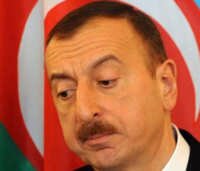 Back in October 2015 at the next meeting of the CIS Heads of States Council, President of Azerbaijan Ilham Aliyev expressed his vision of further cooperation within the framework of the Customs Union. Since the trade between the CIS countries had fallen, he argued, and many of the national currencies of the CIS member-states had lost their strength, it was necessary to move to new forms of economic cooperation, which should form the basis of a new economic model.He agreed with his Russian counterpart's idea of the “working out the question of transition to settlements in national currencies”, since it “will help us avoid certain financial risks... strengthen our national currencies, will further advance the cause of economic integration”. But then he hinted on the necessity to provide more freedom to the CIS countries with natural resources as that would help them cope with the economic crisis. Why “hinted?” The answer is obvious: It would be better for Baku, for example, to realize its hydrocarbons to international markets without regard to its competitors-partners in CIS, especially to the Russian Federation. In other words, it tends to self-sufficiency. For example, Baku is actively promoting the pipeline laying project, through which it plans to increase gas supplies to Turkey and Western countries (refusing from the Russian Gazprom's services). At this, it acts according to the Russian proverb: friendship is all very well, but our tobacco is of different brands! For all its tolerance in the question of gas supply to Europe, it puts Kyiv on a par with Moscow, calling Kyiv not other than a monopolist. “The Pipeline TAP (Trans Adriatic Pipeline), — reads a popular Azerbaijani magazine — is one of the most important elements of the project of the Southern Gas Corridor. At one time it was initiated in order to improve security of gas supplies to Europe through the delivery of natural gas from the Caspian Basin, as well as to exclude Russia as a monopolist-supplier of gas to the Old World, and Ukraine' – as a monopolist in the role of a transit country”. That is, Baku perceives Kyiv as a monopolist, and will be defending its interests in the negotiation process exactly from such a position. And we should be ready for this.
Back in October 2015 at the next meeting of the CIS Heads of States Council, President of Azerbaijan Ilham Aliyev expressed his vision of further cooperation within the framework of the Customs Union. Since the trade between the CIS countries had fallen, he argued, and many of the national currencies of the CIS member-states had lost their strength, it was necessary to move to new forms of economic cooperation, which should form the basis of a new economic model.He agreed with his Russian counterpart's idea of the “working out the question of transition to settlements in national currencies”, since it “will help us avoid certain financial risks... strengthen our national currencies, will further advance the cause of economic integration”. But then he hinted on the necessity to provide more freedom to the CIS countries with natural resources as that would help them cope with the economic crisis. Why “hinted?” The answer is obvious: It would be better for Baku, for example, to realize its hydrocarbons to international markets without regard to its competitors-partners in CIS, especially to the Russian Federation. In other words, it tends to self-sufficiency. For example, Baku is actively promoting the pipeline laying project, through which it plans to increase gas supplies to Turkey and Western countries (refusing from the Russian Gazprom's services). At this, it acts according to the Russian proverb: friendship is all very well, but our tobacco is of different brands! For all its tolerance in the question of gas supply to Europe, it puts Kyiv on a par with Moscow, calling Kyiv not other than a monopolist. “The Pipeline TAP (Trans Adriatic Pipeline), — reads a popular Azerbaijani magazine — is one of the most important elements of the project of the Southern Gas Corridor. At one time it was initiated in order to improve security of gas supplies to Europe through the delivery of natural gas from the Caspian Basin, as well as to exclude Russia as a monopolist-supplier of gas to the Old World, and Ukraine' – as a monopolist in the role of a transit country”. That is, Baku perceives Kyiv as a monopolist, and will be defending its interests in the negotiation process exactly from such a position. And we should be ready for this.
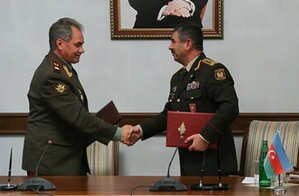 But let us return to President Ilham Aliyev's proposals to provide CIS partners with greater economic independence. What are they caused by? Azerbaijan (obviously) is one of the countries, which today already feel uncomfortable in the wake of Moscow's policy, no matter how hard its leadership is trying to silence this fact. It is more and more difficult for Azerbaijan to agree with the Kremlin all possible initiatives in the international arena, to ask for permission to implementation of its projects or to help the Kremlin in solving geopolitical problems. This can be confirmed by the example of the recent quarrel between Moscow and Ankara, which has turned into a very real, so far “cold war”. Azerbaijan traditionally supporting and constantly advertising its long-standing friendly relations with Turkey, had to somehow restrain its reaction to the Russian-Turkish conflict over the Russian bomber downed by Turkish fighter planes. And even to offer its mediation in the reconciliation of the parties. I do not think that in this case, it was attracted by the honorable role of peacemaker. It just tried to avoid a situation where it would show its sympathy to one side at the expense of relations with the other. But then this is today's fate of non-essential players in the geopolitical arena... By the way, in its confrontation with Yerevan because of the captured Azerbaijani territories, Baku hardly ever comments on the position and role of Moscow. This so-called political correctness, is giving it the opportunity to buy arms and military equipment from Russians. The latest (signed a year ago) contract for the purchase of Russian weapons cost the treasury of Azerbaijan 3 billion US dollars. “Bash for bash” (“Tit for tat”), as the Eastern saying goes, in the language of diplomacy is also called the principle of reciprocity. According to Azerbaijan now it means that be it in minor or in major things, no one should owe anybody anything. And here is appropriate the following episode: at the time of the collapse of the USSR, when, under the “nationalization” had fallen military units and formations of the Soviet Army, Azerbaijan, of all the former socialist republics, paid Moscow a certain amount for the objects, residential and industrial premises left on its territory by the 4th Combined Arms Army. Although it had the right to inherit them for free for its own armed forces that were being created. Rubbing his hands, “well-wishers” were smart: Azerbaijanis have bought from themselves. “Yes, we have — agreed one of the Azerbaijani representatives on the sidelines of negotiations with Russians. — But you need these funds to build housing for servicemen withdrawn from Baku! And we will then owe you nothing”.
But let us return to President Ilham Aliyev's proposals to provide CIS partners with greater economic independence. What are they caused by? Azerbaijan (obviously) is one of the countries, which today already feel uncomfortable in the wake of Moscow's policy, no matter how hard its leadership is trying to silence this fact. It is more and more difficult for Azerbaijan to agree with the Kremlin all possible initiatives in the international arena, to ask for permission to implementation of its projects or to help the Kremlin in solving geopolitical problems. This can be confirmed by the example of the recent quarrel between Moscow and Ankara, which has turned into a very real, so far “cold war”. Azerbaijan traditionally supporting and constantly advertising its long-standing friendly relations with Turkey, had to somehow restrain its reaction to the Russian-Turkish conflict over the Russian bomber downed by Turkish fighter planes. And even to offer its mediation in the reconciliation of the parties. I do not think that in this case, it was attracted by the honorable role of peacemaker. It just tried to avoid a situation where it would show its sympathy to one side at the expense of relations with the other. But then this is today's fate of non-essential players in the geopolitical arena... By the way, in its confrontation with Yerevan because of the captured Azerbaijani territories, Baku hardly ever comments on the position and role of Moscow. This so-called political correctness, is giving it the opportunity to buy arms and military equipment from Russians. The latest (signed a year ago) contract for the purchase of Russian weapons cost the treasury of Azerbaijan 3 billion US dollars. “Bash for bash” (“Tit for tat”), as the Eastern saying goes, in the language of diplomacy is also called the principle of reciprocity. According to Azerbaijan now it means that be it in minor or in major things, no one should owe anybody anything. And here is appropriate the following episode: at the time of the collapse of the USSR, when, under the “nationalization” had fallen military units and formations of the Soviet Army, Azerbaijan, of all the former socialist republics, paid Moscow a certain amount for the objects, residential and industrial premises left on its territory by the 4th Combined Arms Army. Although it had the right to inherit them for free for its own armed forces that were being created. Rubbing his hands, “well-wishers” were smart: Azerbaijanis have bought from themselves. “Yes, we have — agreed one of the Azerbaijani representatives on the sidelines of negotiations with Russians. — But you need these funds to build housing for servicemen withdrawn from Baku! And we will then owe you nothing”.
This fact is, in my opinion, not only revealing but also has no analog in the former USSR's territories.
Is the Russian Market Being Closed?
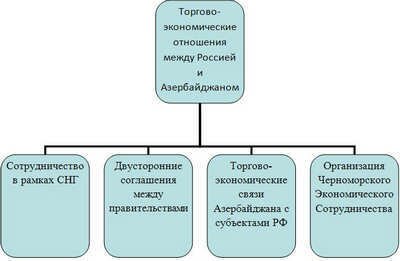
Based on the published last year by the State Customs Committee of Azerbaijan's data, in January-September 2015 the trade turnover between Azerbaijan and Russia amounted to 1.34 billion US dollars. United States (8.74 % of the total foreign trade turnover). It's almost two percent less than over the same period in 2014. By the middle of 2015, Russia invested into Azerbaijan's economy more than 1.8 billion US dollars. In its turn, Azerbaijan, over the same period allocated over 1 billion US dollars of investments to the Russian economy. That is, the turnover is definitely decreasing, at least in the last two years, and the situation will not improve this year or next year. Even if Baku tries to replace with its agricultural products the banned in Russia Turkish food. “We are absolutely not interested in reducing the trade with Russia. But, unfortunately, there are factors that do not depend on us”, said Deputy Minister of Economy and Industry of Azerbaijan S. Hasanova. She is convinced that the reduction of mutual trade turnover was caused by the current economic situation in Azerbaijan and Russia. And she does not agree that there is a process of extrusion of Azerbaijan from the Russian market. In the middle of last year, the World Bank, not without reason, warned that even an increase in trade with Russia could not be profitable for Azerbaijan, as its economy would only lose. But Baku at all levels keeps repeating that is not interested in folding its cooperation with Moscow. It actively encourages functioning on the territory of the republic of about 600 companies with Russian capital. By the way, about 300 of them are a joint ventures, and 200 — with 100 percent Russian capital. Gazprom, KAMAZ, the Bank VT included. But, as pointed out by the expert in the field of economy O. Akhverdiyev, today Azerbaijan purchases from Russia only what it cannot produce independently or import from other countries: “For example, a weapon that NATO refuses (!- Author) to sell to the armed forces of Azerbaijan”. Perhaps, it is the only single-source “product” for Azerbaijan. In any case, until the moment when the “cold” confrontation with the Armenians “suddenly” turns into a “hot” one. Or, until Russia, irritated by active bilateral Azerbaijani-Turkish cooperation, closes the doors of its “Post Exchange” for Azerbaijan. And will put a gate down in front of the rest of its products. That is why, the costs of the recent test run of trains on the Ukrainian-Azerbaijani segment of the Silk Road should not be seen as accidental fault of the experts responsible for this matter. Because the Russian branch of the same way was demonstratively tested at the same time and had to look more preferred to potential customers.
To be continued…

